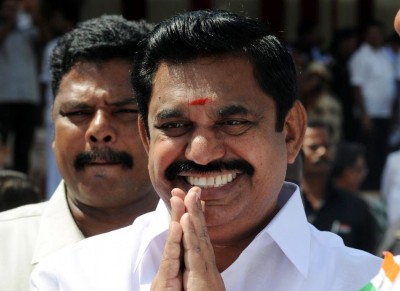Chennai, Aug 31 : Tamil Nadu Chief Minister K. Palaniswami on Monday wrote a letter to Prime Minister Narendra Modi in which he said that the central government has the moral and legal obligation to compensate the states for the shortfall in Goods and Services Tax (GST) collections.
Palaniswami also urged Modi to direct the Ministry of Finance to agree to a mechanism whereby the central government raises the required funds as a loan and lends it to the GST Compensation Fund against future cess receipts, so that the GST compensation can be paid in full to the states in 2020-2021.
In a letter to Modi, the text of which was released to the media here, Palaniswami said: “Our stance has consistently been that the Government of India has a moral and legal obligation to pay the compensation for the shortfall in GST collections. We had also indicated that it was for the Government of India to find the necessary funds to compensate the States, including from the Consolidated Fund of India, if there was a shortfall in the cess collections.”
He said most states and in particular Tamil Nadu, agreed to the implementation of GST and to support the legislation on the basis of the unequivocal commitment given by the central government to compensate the States for any revenue loss.
“Such compensation is clearly assured in the 101st Constitution Amendment Act and in the GST (Compensation to States) Act, 2017,” Palaniswami said.
According to Palaniswami the total compensation due for shortfall in revenue collection for Tamil Nadu is Rs 12,250.50 crore.
Tamil Nadu Chief Minister also said the suggestion made by the state Fisherines Minister D. Jayakumar at the 41st GST Council meeting on August 27 was a reasonable and practical one and was agreed to by almost all the states.
At the Council meeting Jayakumar suggested the central government could mobilise resources and lend the funds required to the GST Compensation Fund and that loan could be serviced through an extension of the GST Cess for a few years beyond 2021-22.
“Ensure that the states get their full dues of the compensation in the current year itself, and reduce neither the compensation payable nor the already announced and committed additional borrowing permissible to states of 2 per cent of GSDP (gross state domestic product) under the Atmanirbhar Bharat stimulus package in any circumstances,” Palaniswami said.
He also said the Finance Ministry should provide a formal and categorical assurance that any spillover of the compensation due will be paid in the period after 31st March, 2022 and also relax the conditions to permit States to borrow under the Atmanirbhar Bharat Scheme.
According to Palaniswami, these measures will ensure that states are treated justly and fairly and also have adequate funds in 2020-21 to meet essential expenditure commitments, and can thus effectively contribute to the revival of the economy.
Disclaimer: This story is auto-generated from IANS service.

